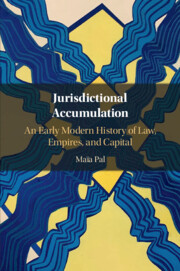Book contents
- Jurisdictional Accumulation
- Jurisdictional Accumulation
- Copyright page
- Dedication
- Epigraph
- Contents
- Acknowledgements
- Introduction
- 1 Early Modern Extraterritoriality
- 2 Historical Sociology, Marxism, and Law
- 3 Social Property Relations
- 4 Ambassadors
- 5 Consuls
- 6 Colonial Practices of Jurisdictional Accumulation
- 7 Analytical Crossroads
- Epilogue
- Bibliography
- Index
3 - Social Property Relations
Published online by Cambridge University Press: 15 October 2020
- Jurisdictional Accumulation
- Jurisdictional Accumulation
- Copyright page
- Dedication
- Epigraph
- Contents
- Acknowledgements
- Introduction
- 1 Early Modern Extraterritoriality
- 2 Historical Sociology, Marxism, and Law
- 3 Social Property Relations
- 4 Ambassadors
- 5 Consuls
- 6 Colonial Practices of Jurisdictional Accumulation
- 7 Analytical Crossroads
- Epilogue
- Bibliography
- Index
Summary
Chapter 3 focuses on the social property relations of each case building on the Political Marxist tradition and by engaging with international legal history. This chapter presents the major institutions, actors, and jurisdictional disputes that provide bases to understand, first, the local specificities of the Castilian kingdom and its American colonies, emphasising the broader Iberian fragmented assemblage and the role of theologians in the particular politico-religious form of empire linked to principles of morality and law. In France, the focus is on Louis XIV and his ministers trying to contain the various jurisdictional regimes and conceptions of space, as well as legal actors and orders. The role of England’s social property relations is discussed in relation to the common law and to enclosures in primitive accumulation and the transition to capitalism. Finally, the Dutch Republic highlights the problem of transition and the specific jurisdictional context of its confederation, as well as the role of merchants and magistrates in shaping its politics. The chapter describes practices that could be considered as extensions rather than transports or transplants of authority.
Keywords
- Type
- Chapter
- Information
- Jurisdictional AccumulationAn Early Modern History of Law, Empires, and Capital, pp. 103 - 158Publisher: Cambridge University PressPrint publication year: 2020



